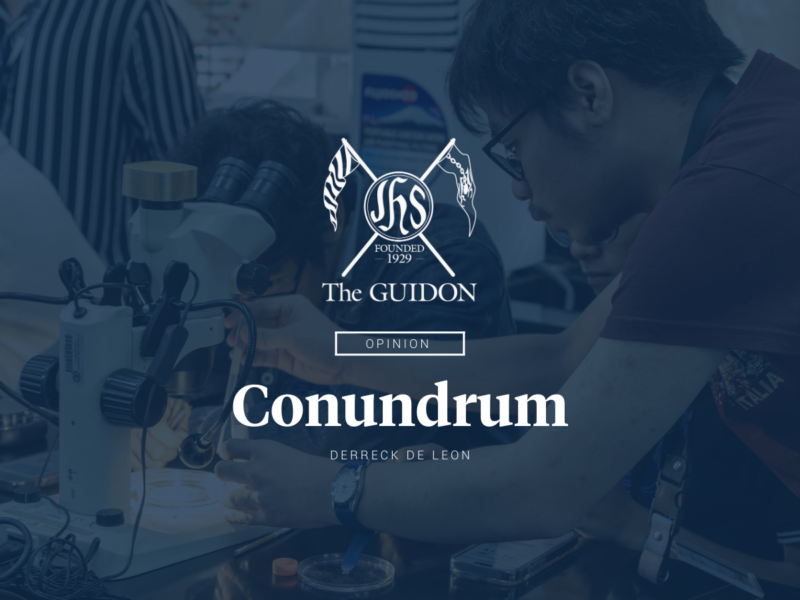IN A memo released on January 13, university president Fr. Jose Villarin, SJ has announced the formation of the Ateneo Traffic Group (ATG), in response to the anticipation of escalated traffic problems as Katipunan Avenue becomes a conduit for the South and North Luzon motorways.
Villarin said in the memo that solving campus mobility challenges would help achieve a sustainable campus. “We will need sharp minds and resolute wills to design a new framework for campus mobility,” he explained.
The ATG is tasked to review the university’s current policies and systems on traffic management, identify areas for improvements and propose short- and medium-term solutions. It must also assess the proposals of the Metropolitan Manila Development Authority (MMDA) on improving the traffic flow along Katipunan.
The group is composed of Edna Franco, outgoing Vice President for Administration and Planning; Jose Arnulfo Batac, Director of Facilities Management; Czarina Saloma-Akpedonu, associate professor of the Sociology Department and director of the Institute of Philippine Culture (IPC); Abigail Favis, faculty member of the Environmental Science Department and coordinator of the Ateneo Environmental Management Council; and Kardi Teknomo, Associate Professor at the Information Systems and Computer Science Department.
It was first convened last year and started planning in November 2011. The ATG has been conducting weekly meetings since then.
AIG’s research is funded by the IPC, although capital expenditure will have to be programmed into the university’s budget, said Franco.
Social dimension of traffic
“Traffic is a social problem,” said Favis. It is a prevailing issue in the Katipunan area, and members of the Ateneo community must also take responsibility because they also contribute to the road congestion, she added.
The ATG is currently studying all aspects of mobility in the campus, but Favis said that no conclusions could be given at the moment because the study is still ongoing.
“[We] are studying the sticker system, traffic enforcement, traffic rules, the efficiency of pedestrian lanes, the efficiency of crossings and how many intersections there are,” she said.
“We are very keen on also consulting with the community because for sure we will not be able to cover everything,” Favis added.
The ATG also hopes that the study will make Ateneans understand the traffic problem in a bigger context and be more socially responsible.
Freshman Lloyd Joshua Franco suggests that ATG look for a way to decrease the volume of cars in the Katipunan area.
“The main mode of transportation of a number of Ateneans is by private car. Unless ATG finds a way to decrease the number of cars, I don’t think the traffic problem will be solved,” he said.
Still on the planning stage
The ATG has been monitoring the vehicular flow within the Ateneo at peak traffic times and is tracking the plate numbers of certain cars to identify what time they enter and leave campus.
As of press time however, the group is still on the study stage. “We’re counting the cars, we’re studying behavior, how people use transportation, [and] the different social considerations that we have to think about,” Favis said.
Focus group discussions, key-informant interviews and community meetings will also be conducted. “We don’t expect that the solutions would only come from us. I’m sure most of the creative solutions would come from the community,” Favis said.
On March 9, the ATG met with representatives from the different units and sectors of the Ateneo and talked about the traffic issue.
Dr. Franco said that they hoped to consolidate the data by the end of March so that they could do some pilot-testing, or ATG could go back to the community and then hopefully get approval from the administration board by May.
However, Franco believes that the root cause of the problem should be identified in order to come up with effective and lasting changes. “Intuitively we already know that there are just too many vehicles. But before we can talk about solutions, we really need to zero in on the root cause,” she said.
The ATG also plans on consulting with external partners and experts including barangay captains, the MMDA and the Office of the Quezon City Vice Mayor, among others.
Addressing the traffic problem
In the long run, ATG aims to significantly improve the traffic flow within campus, and to manage not only the flow of students and their vehicles but also the environmental footprint they leave behind.
Favis expounded on how the work of ATG will benefit the environment: “[If] we can address the efficiency of vehicles or if we’re lucky enough that we can reduce the number of vehicles, that will [reduce] the amount of air pollution being emitted in the atmosphere,” she said.
For now, students can expect only slight changes in the overall traffic scheme. “We need to think long-term. We can’t have only short-term solutions, but because there is an ATG, people will expect something by June. We do expect to implement some changes and some new approaches by then,” said Franco.






